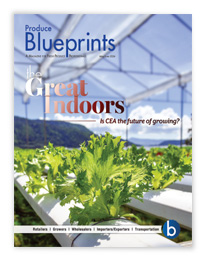Woodland, CA, October 6, 2020 – The Center for Produce Safety (CPS) has funded 14 new research projects, valued at just over $3.3 million, to help answer industry’s most urgent produce food safety questions.
The 14 funded projects address pressing industry science needs by supply chain sector, including evaluating the role of dust in transferring foodborne pathogens, inactivation of Cyclospora, and answer critical knowledge gaps regarding the survival of infectious virus in surface water.

Vic Smith, Chair, CPS Board of Directors
“CPS’s work continues through the COVID-19 pandemic because all of us in the fresh produce industry can never take our eyes off of our shared responsibility to enhance produce safety,” said Vic Smith, chair of CPS’s volunteer Board of Directors and CEO of grower-shipper J.V. Smith Companies. “We appreciate our research community’s commitment to helping CPS achieve its mission to fund science, find solutions and fuel produce safety change across the supply chain.”
All projects will begin in January 2021. Findings will be reported to industry by researchers at CPS’s annual Research Symposium, and via CPS through other knowledge transfer activities including CPS’s website.
Scott Lenaghan, Ph.D., of the University of Tennessee is a first-time award recipient for his project, “Determination of physical and chemical mechanisms to prevent Cyclospora infection.”
“Given the increase in Cyclospora outbreaks, coupled with CPS’s work demonstrating the prevalence of this pathogen in our domestic water supply, to enhance produce safety it is now time to focus on effective means to inactivate Cyclospora,” said Lenaghan.”We will evaluate use of state-of-the-art robotics and image processing to automate screening to validate that Cyclospora has been inactivated, removing the current barrier of laborious manual analysis. The outcome of the project will be valuable guidance to industry on a well-characterized method for inactivating Cyclospora.”
Luxin Wang, Ph.D., University of California-Davis, received a first-time award for her proposal, “Waxing of whole produce and its involvement in and impact on microbial food safety.”
“Limited information is available about the impact of waxing on the microbial food safety of fresh produce,” Wang said. “We will investigate the survival of common foodborne pathogens, Salmonella and Listeria monocytogenes, in waxes, and evaluate the microbiological impact of applying and heat drying waxes. Our goal is to provide data the fresh produce industry needs to conduct risk assessments of their waxing steps.”
CPS research awards are made possible by funds provided by the Center for Produce Safety’s Campaign Contributors, the Specialty Crop Block Grant programs in California Department of Food and Agriculture, Washington State Department of Agriculture, Florida Department of Agriculture and Consumer Services, and Texas Department of Agriculture.
2020 RFP Grant Recipients
All projects will begin January 2021
Ana Allende, Ph.D., Centro de Edafologia y Biologia Aplicada del Segura (CEBAS) – CSIC
Kelly Bright, Ph.D., University of Arizona
When the E. coli hits the fan! Evaluating the risks of dust-associated produce cross-contamination
Jinru Chen, Ph.D., University of Georgia
Overcome critical food safety challenges of blueberry harvesting
Francisco Diez-Gonzalez, Ph.D., University of Georgia
Control of Listeria monocytogenes in processing/packing plants using antimicrobial blue light (aBL)
Malak Esseili, Ph.D., University of Georgia
Survival of infectious human norovirus in water and on leafy greens
Scott Lenaghan, Ph.D., University of Tennessee
Determination of physical and chemical mechanisms to prevent Cyclospora infection
Kevin Mis Solval, Ph.D., University of Georgia
Nitin Nitin, Ph.D., University of California, Davis
Bio-based antimicrobial coatings for reducing risk of cross-contamination during harvesting
Nikki Shariat, Ph.D., University of Georgia
Understanding and predicting food safety risks posed by wild birds
Matthew Stasiewicz, Ph.D., University of Illinois
Digital farm-to-facility food safety testing optimization
Abhinav Upadhyay, Ph.D., University of Connecticut
Mohit Verma, Ph.D., Purdue University
Field evaluation of microfluidic paper-based analytical devices for microbial source tracking
Luxin Wang, Ph.D., University of California, Davis
Waxing of whole produce and its involvement in and impact on microbial food safety
Meijun Zhu, Ph.D., Washington State University
Validation of sanitizer disinfection of wash water in dump tank operation of apple packing lines


